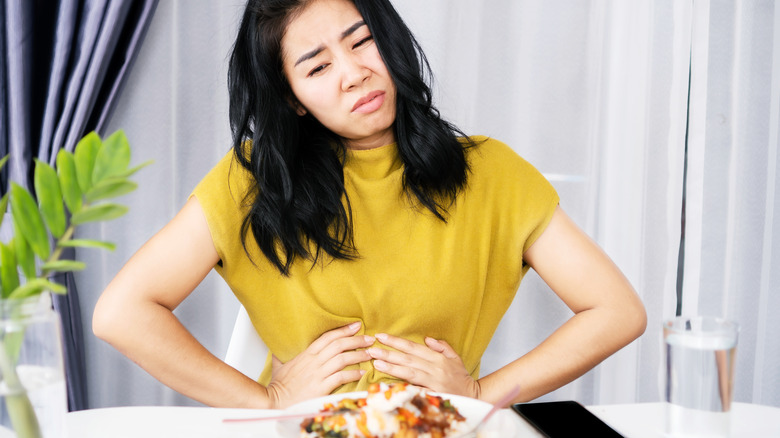What It Really Means When You Feel Nauseous After Eating
It's common to feel a little sick after eating an entire pint of ice cream or six slices of pizza, but you shouldn't experience these symptoms after a normal, healthy meal. Feeling nauseous after eating can point to a variety of health concerns. When you eat, your food passes through your digestive system (via Medical News Today). This refers to the collective group of body parts and organs that are responsible for breaking down your food and helping your body digest it. Technically, the digestive system includes your mouth and throat, but it most commonly refers to the stomach and intestines. Nausea is typically caused by an issue in that part of the body.
Nausea after eating can sometimes be hormonal. Pregnant women often feel nauseous after eating. This may be because increased hormone levels can cause food to spend a longer amount of time in the stomach and small intestine, which may cause nausea. Pregnancy hormones can also relax the muscles connecting the esophagus to the stomach. This can increase the likelihood of acid reflux, which can cause nausea as well.
Underlying health issues that may cause nausea after eating
If you experience nausea after eating a normal meal, you may have an underlying health condition that is at the root of the problem. According to Healthline, food allergies can sometimes cause nausea, although they will typically be accompanied with other symptoms like mouth swelling or hives. The stomach virus, which is an infection in the intestines, often creates feelings of nausea and stomach upset. Gallbladder disease is another health condition that may result in feeling sick after eating.
Other potential causes of nausea after eating include irritable bowel syndrome, food poisoning, anxiety or stress, cancer treatment, and motion sickness. If you consistently experience an upset stomach after eating, it's best to visit your doctor about it. They can help you find the root of the problem, whether it's pregnancy, food allergies, or a health condition. They can also help you make the necessary medical or lifestyle changes to help you get back to enjoying your meals without the accompanying nausea.


